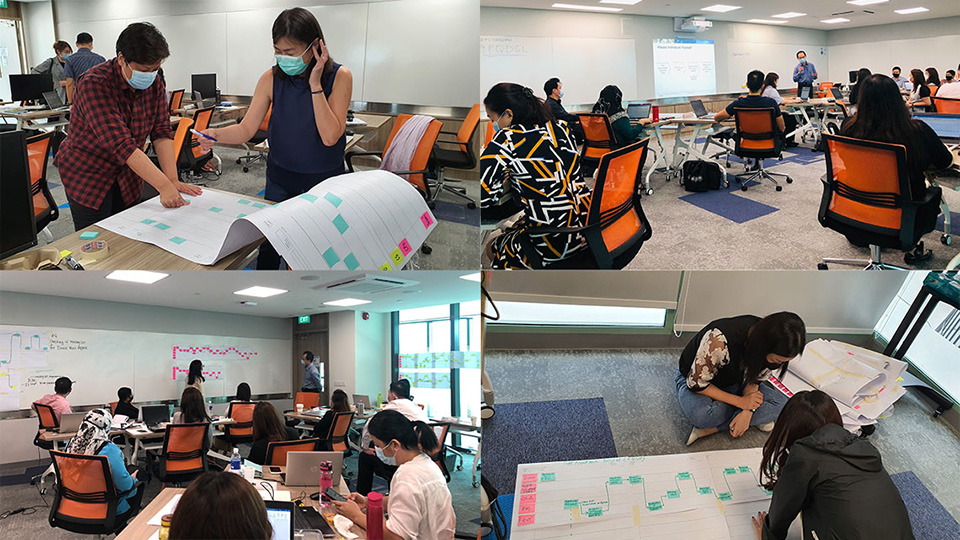As the University’s lead office to build resources through the cultivation and stewardship of philanthropic support, the NUS Development Office (DVO) strives to constantly enhance its fundraising goals and tighten these processes. With the aim of increasing the speed and quality of its services, DVO teamed up with the Organisational Excellence Transformation Unit (OETU) to identify and streamline its processes over a period from August 2021 to April 2022.
The first step was to send DVO staff for Business Process Re-engineering (BPR) training to better analyse current processes and design new ones. Attending the course together provided the staff with a common understanding of the BPR methods and terminology that would enable them to participate in constructive discussions later on. The hands-on group exercises kickstarted discussions on existing processes, providing an opportunity for the staff to begin applying their new BPR knowledge.
 Development Office colleagues attending the Business Process Re-engineering course at the NUS Institute of Systems Science
Development Office colleagues attending the Business Process Re-engineering course at the NUS Institute of Systems Science
Following the trainings, an exercise was held to gather the pain points experienced across the unit and examine all processes to generate improvements and boost the business impact potential. 13 internal teams submitted 45 pain points, of which 11 were selected to form five BPR projects. These projects would examine how government matching grants are processed, how constituent records are updated, the application for naming approvals, as well as review the workflow for staff donations and the preparation of thank you letters to donors.
To form the BPR project teams, careful consideration was given to include process owners and internal process users across DVO. This produced robust discussions that reviewed the existing processes in a holistic manner, resulting in the development of new processes that took the user experience into greater account. A second advantage of this method was that it allowed for more staff to refine their BPR knowledge through on-the-job training.
Over five months, the five teams studied a total of 128 existing process steps, eliminating several bottlenecks to finally reach 72 new process steps. Notably, when the constituent records team rigorously questioned all existing steps, it was discovered that as many as 10 of them could be eliminated due to less effective legacy procedures. Associate Director Ms Kew Wern Ching recounted that a key question to ask was whether the legacy processes were still delivering their expected values. “Impactful change will happen only when we relook at these processes from a different perspective and try to solve them with out-of-the-box methods,” she said.
Another learning point arose when the team that worked on the preparation of thank you letters decided to hold pilot tests of the new process with small groups of stakeholders. This gave the team an early opportunity to communicate with users about the changes made and address concerns. “From picking up BPR skills at the course that we attended last year, to applying it in our work today, the team has gained a lot from this exercise. Not only do we now have a new and improved work process that we are proud of, we can also apply the skills to other projects and share our learnings with other teams. Through leveraging technology and other digital communications platforms, the team also discovered that the new process encouraged a more collaborative work culture,” shared Ms Kelly Tan, Associate Director at DVO.
The five BPR projects are now in active stages of implementation, with the teams continuing to review their efficacy and explore longer-term process improvements. Vice President (Development) Mr Edi Fung expressed, “We hope colleagues who participated in the five BPR projects can be our internal champions to maintain the BPR mindset in DVO. They should push for continuous and critical reviews and improvements of our processes, and actively participate in future BPR projects in DVO leveraging their experiences from this round of BPRs."